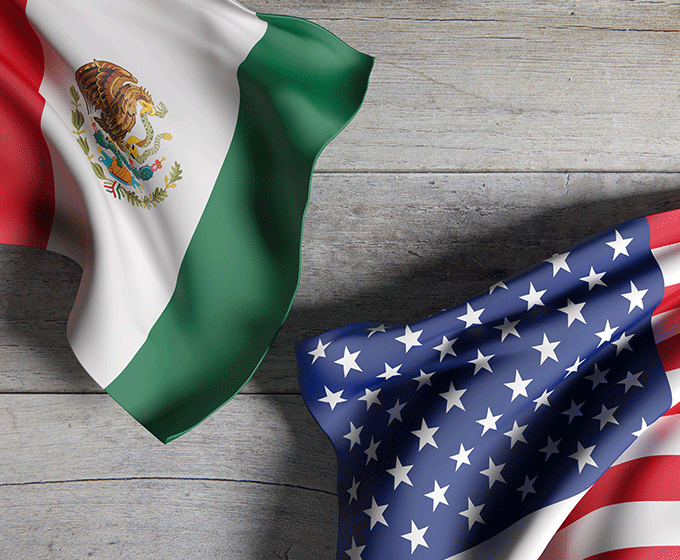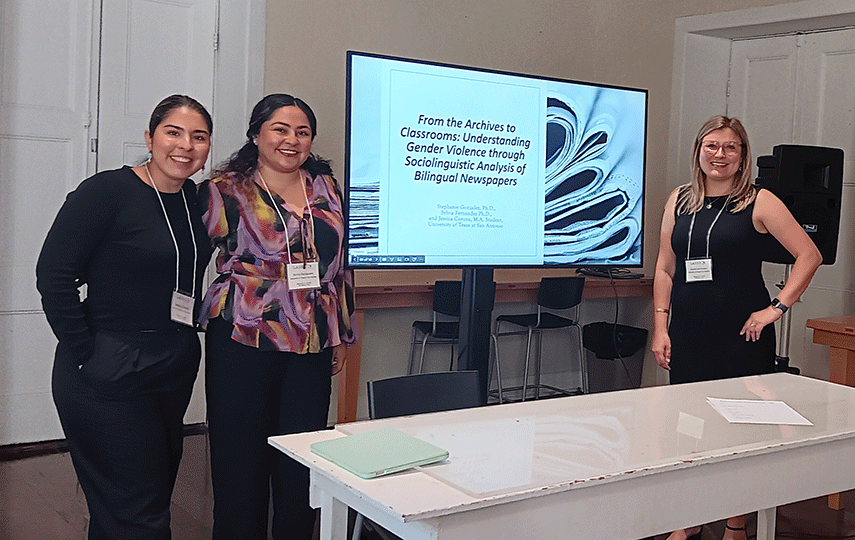
JANUARY 9, 2025 — Sylvia Fernández-Quintanilla, an assistant professor of public and digital humanities, has been awarded a two-year, $150,000 Mellon Foundation planning grant to establish the Transborder Digital Humanities Center-Consortium (TBDH). This innovative project will promote transdisciplinary and translingual research and teaching rooted in transborder thinking and digital humanities. Equally as important, this work will create new opportunities for collaboration and education, allowing educators to better understand and engage with the social justice issues that impact borderland communities in the Americas.
The TBDH will serve as an interdisciplinary hub for research, teaching and community engagement focused on borderland studies across the Americas. As a collaborative initiative, the TBDH will bring together scholars, students and community partners to explore and document the histories, cultures and lived experiences of transborder communities.
Through the center-consortium, UTSA aims to create innovative knowledge-sharing platforms and foster cross-institutional collaborations that address social justice issues in border regions. This structure positions TBDH as a guiding organization for projects, initiatives and partnerships advancing transborder scholarship.

The Transborder Digital Humanities Center-Consortium at UTSA currently has many contributors, including graduate student Jessica Corona (left) and professors Sylvia Fernández-Quintanilla (center) and Stephanie Gonzalez (right).
“We are thrilled to have the Mellon Foundation support the creation of the Transborder Digital Humanities Center-Consortium,” said Glenn Martinez, dean of the UTSA College of Liberal and Fine Arts. “COLFA is taking a strong step forward in expanding our understanding of borderlands and the cultural complexities they represent. This is important work that supports UTSA’s mission as a Hispanic Serving Institution.”
The TBDH will explore and document borderlands’ transgressive histories, beginning with the U.S.-Mexico border. Fernández-Quintanilla seeks to create digital knowledge spotlighting the lived experiences and counter stories of border and transborder communities by utilizing, modifying and developing digital and public humanities tools and methods.
This project aims to encourage communities globally to rethink and broaden the concept of borders across the Americas. It will explore ideas, practices and teaching methods to support impactful community research.
Fernández-Quintanilla has spent more than a decade researching borderlands cultures through archives, literature and language and developing internationally recognized multilingual digital humanities projects. She will lead a 10-person team of scholars and activists from a diverse group of institutions and across multiple disciplines, including critical border studies, ethnic and race studies, literatures and languages, and women, gender and sexuality studies.
TBDH started through the work of United Fronteras, an autonomous and collaborative project in 2019 that created the first transborder bilingual directory and had a transnational online symposium to engage with the creators of borderlands digital materials and projects that shed light to multiple stories and representations of the U.S.-Mexico border.
The UTSA TBDH currently includes contributors Sylvia Mendoza, assistant professor in the Department of Race, Ethnicity, Gender, and Sexuality Studies, and Stephanie Gonzalez, assistant professor in the Department of Modern Languages and Literatures. Contributors include Carolina Alonso (Fort Lewis College), Laura Gonzales (University of Florida), Maira Alvarez (St. Mary’s University), and Brian Rosenblum (University of Kansas).
The TBDH was awarded under the Mellon Foundation Higher Learning program, which creates opportunities for experiential learning. The consortium will enable students to apply theoretical knowledge to real-world issues while collaborating with faculty and library professionals to enhance transborder digital humanities research and professional development.
The TBDH will award fellowships to undergraduate and graduate students. Under the mentorship of Fernández-Quintanilla, Jessica Corona will be the first TBDH fellow. She currently is a master’s student in the UTSA Spanish program, and her two-year fellowship will support her research on gender violence and feminicides in El Paso and San Antonio. This work will inform her thesis, contributing to a transborder bilingual database. She will also co-teach a course and present her research at conferences.
Additionally, the TBDH will serve as a vital resource for curricula addressing social justice issues across border regions. Researchers will create and strengthen a comprehensive multilingual platform that will feature datasets, archives, interactive visualizations, digital editions, podcasts, open educational resources (OERs), tutorials and other tools for community-engaged digital scholarship.
Starting in Spring 2025, the TBDH will host a speaker series in San Antonio that will culminate in the Transborder Digital Humanities Symposium at UTSA in May 2026. This event, co-organized with the Latin American and Caribbean DH Symposium, at the University of Florida, will feature keynote speakers and gather scholars, students and community members to discuss border and transborder studies at the intersection of digital and public humanities.
“The TBDH Center-Consortium Mellon grant will allow us to plan cross-institutional digital scholarship, curriculum, workshops, talks and fellowship programs to expand the understanding of geopolitical borders throughout history,” Fernández-Quintanilla said. “Our aim is to promote ethical and responsible practices in documenting and sharing border stories, enriching both analog and digital cultural and historical records.”
Through this initiative, Transborder Digital Humanities will provide support to students and scholars while encouraging collaboration with libraries, museum professionals and community partners across the Americas.
UTSA Today is produced by University Communications and Marketing, the official news source of The University of Texas at San Antonio. Send your feedback to news@utsa.edu. Keep up-to-date on UTSA news by visiting UTSA Today. Connect with UTSA online at Facebook, Twitter, Youtube and Instagram.
Move In To COLFA is strongly recommended for new students in COLFA. It gives you the chance to learn about the Student Success Center, campus resources and meet new friends!
Academic Classroom: Lecture Hall (MH 2.01.10,) McKinney Humanities BldgWe invite you to join us for Birds Up! Downtown, an exciting welcome back event designed to connect students with the different departments at the Downtown Campus. Students will have the opportunity to learn about some of the departments on campus, gain access to different resources, and collect some giveaways!
Bill Miller PlazaCome and celebrate this year's homecoming at the Downtown Campus with food, games, giveaways, music, and more. We look forward to seeing your Roadrunner Spirit!
Bill Miller PlazaThe University of Texas at San Antonio is dedicated to the advancement of knowledge through research and discovery, teaching and learning, community engagement and public service. As an institution of access and excellence, UTSA embraces multicultural traditions and serves as a center for intellectual and creative resources as well as a catalyst for socioeconomic development and the commercialization of intellectual property - for Texas, the nation and the world.
To be a premier public research university, providing access to educational excellence and preparing citizen leaders for the global environment.
We encourage an environment of dialogue and discovery, where integrity, excellence, respect, collaboration and innovation are fostered.